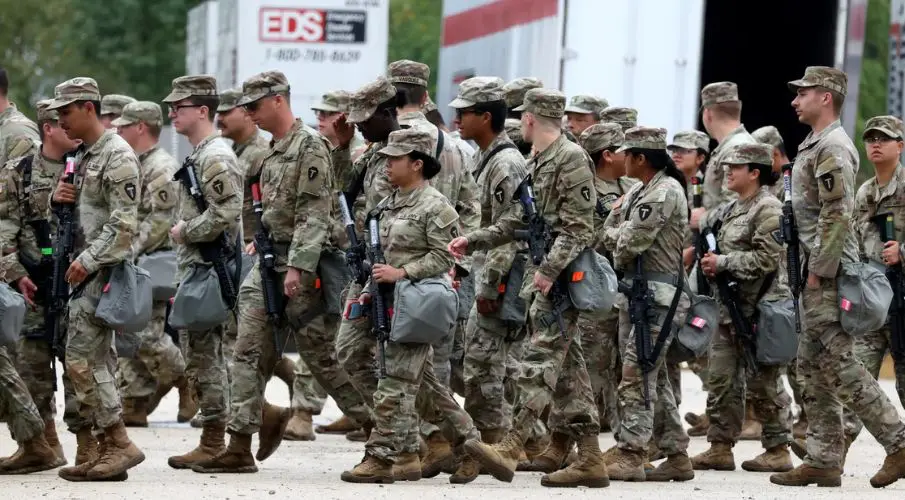What is unfolding this Tuesday in the southwestern suburbs of Chicago is more than a show of force - it is a precedent. The first units of the Texas National Guard arrived in the afternoon at the U.S. Army Reserve Center in Elwood, accompanied by heavy equipment, armored vehicles, and an entourage of federal agents. As journalists on-site filmed their arrival, FBI Director Kash Patel was already on his way to Chicago. According to the Department of Justice, the National Guard is to ensure the safety of federal officers - officially in response to violent incidents during protests against ICE operations. Unofficially, it is clear: this marks the next stage of a federal power struggle.
Illinois had tried to block the deployment of the Texas troops through the courts. A judge on Tuesday morning rejected the state government’s emergency request to temporarily prohibit the arrival of the units. By the time the main hearing takes place later in the week, the soldiers will already be in the city - with the explicit approval of the White House. Hundreds of guardsmen are reportedly set to begin exercises on Tuesday before officially patrolling in the coming days. It is the first time in decades that troops from one state have been sent into another without the consent of the affected governor.

Donald Trump seized the opportunity to exploit the conflict politically. During a meeting with Canadian Prime Minister Mark Carney in the Oval Office, he declared: “Chicago is a great city, but it has a crime problem. If the governor can’t do the job, we’ll do the job.” With that, the president openly questioned that public safety is the responsibility of the states - and overrode the federal balance that has held for generations. The statement was as calculated as it was dangerous: an announcement that the president sees himself as the supreme enforcer above local institutions.

Attorney General Pam Bondi defended the move before Congress - and engaged in a sharp exchange with Democratic Senator Dick Durbin, who called the deployment a “political escalation.” Bondi countered with numbers: “Your city has a murder rate five times higher than New York’s. 571 homicides last year. If you were serious about protecting your people, you would be asking this administration for help instead of rejecting it.” But Durbin’s office responded: Chicago Police Department data show 458 murders in the past twelve months - nearly 30 percent fewer than in previous years. A number that exposes Bondi’s argument, though it changes nothing about the political reality of the day.
Mayor Brandon Johnson reacted with outrage. “Illegal, unconstitutional, dangerous - and wrong,” he said. “This isn’t about deportation, it isn’t about safety. It’s about authoritarianism. About fear. And about breaking the Constitution.” His words echo earlier American crises - moments when power was mistaken for security.
As the troops assemble in barracks south of the city, the situation remains tense. The White House speaks of a “temporary protection order” to support ICE agents; in reality, a political front line is taking shape. Already, it appears that the National Guard could begin patrolling the greater Chicago area in the coming days - alongside the FBI, under direct orders from Washington. The symbolism of this deployment is unmistakable. Troops sent from Texas are marching into Illinois on the president’s command, while the state’s own governor tries to stop them. It is a federal state of exception disguised as a security measure. For now, it is only hundreds of soldiers, and the official line remains that they are “protecting federal personnel.” But behind the bureaucratic language lies a dangerous experiment: a test of whether the line between civil order and military control in the United States can still be maintained.

Even Pope Leo XIV, asked in Rome for his opinion, refused to comment. “I do not comment on political decisions of the United States,” he said in Italian. Yet his restraint speaks louder than many speeches: it suggests that the world has already understood what is being tested in Chicago - a new kind of American domestic policy in which the military once again stands on the streets of a democracy.
Investigative journalism requires courage, conviction – and your support.
Please also strengthen our journalistic fight against right-wing populism and human rights violations. We do not want to finance ourselves through a paywall so that everyone can read our research – regardless of income or origin. Thank you very much!


Ich verliere langsam, aber sicher den Glauben daran, dass die amerikanische Demokratie noch zu retten ist. Zu viele buckeln einfach vor Trump und seinen Komplizen. Aber selbst ein Amtsenthebungsverfahren würde nicht helfen. Denn ist Trump weg, kommt Vance, Pest oder Cholera.
..der donnerstag, also morgen wird wichtig, was vor gericht passiert
Man schaue sich das Bild an.
Frauen und viele People of color. Sie marschieren für Faschisten und gegen die eigene Bevölkerung.
Ist ihnen nicht klar, dass sie die nächsten sind, die der White Supremacy im Weg stehen?
Traurig, wie das Gericht entschieden hat.
Ein Richter ohne Rückgrat. Ein Richter, der nicht die Vetfassung schützt.
Wie und wer soll das noch aufhalten?
Auch die westliche Welt schweigt.
Und vom Papst ist es ein Armutszeugnis sich so um klare Worte zu drücken.
Aber das gab es ja schon 1933, als ein deutscher Faschist an der Macht war. Die katholische Kirche hat sich weg geduckt.
Das macht sie jetzt wieder.
…morgen ist der termin am gericht, und das die usa zu meist aus einwanderern besteht, sollte man in den militärunterricht aufnehmen